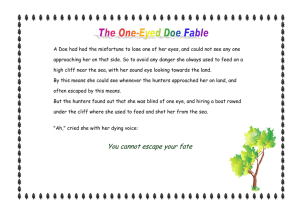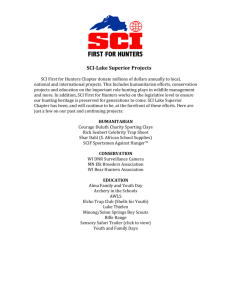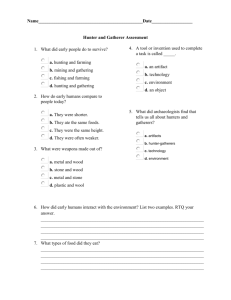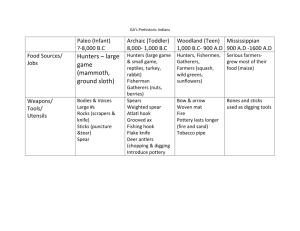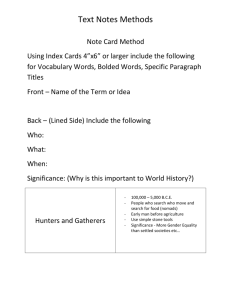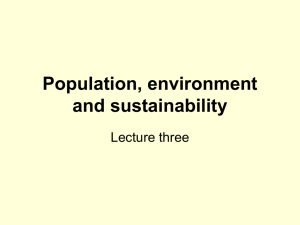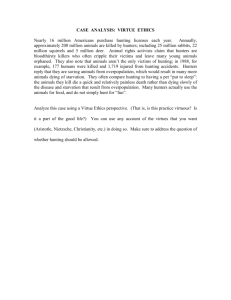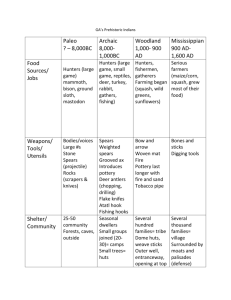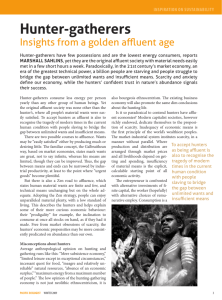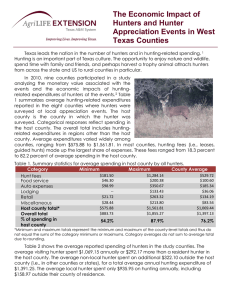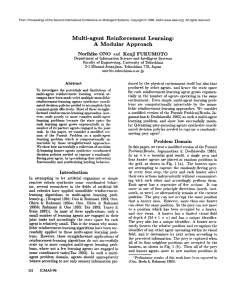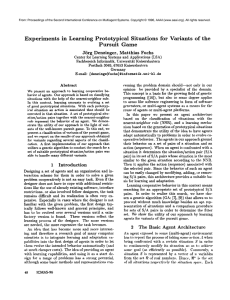Ecology and Economics Discussion, Part II
advertisement
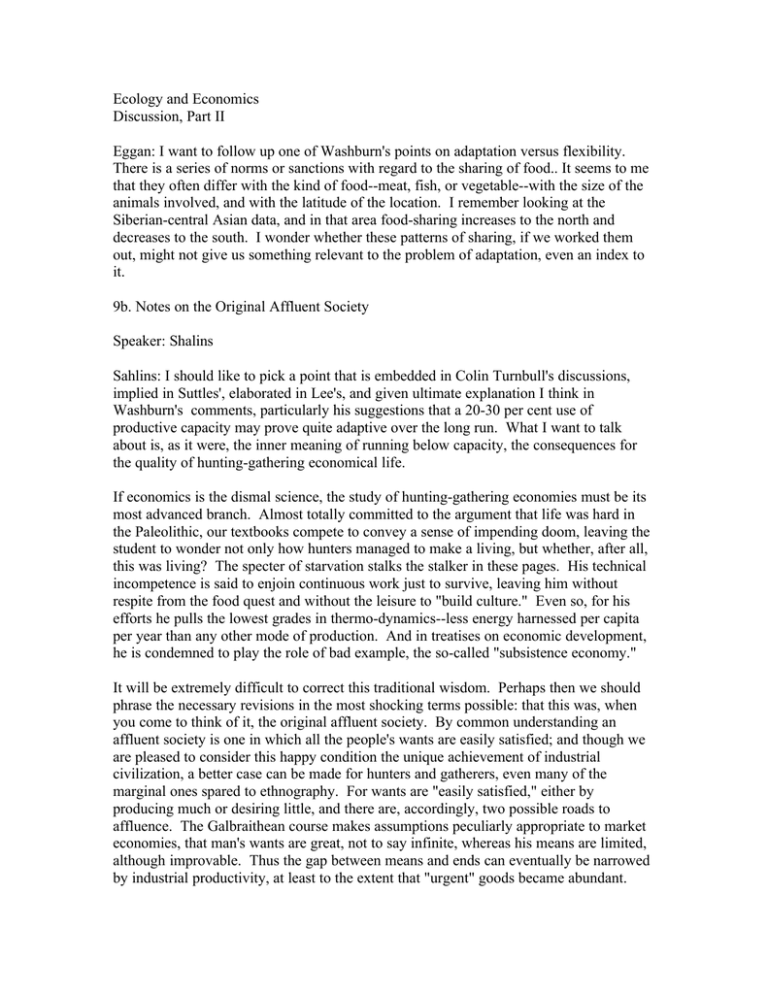
Ecology and Economics Discussion, Part II Eggan: I want to follow up one of Washburn's points on adaptation versus flexibility. There is a series of norms or sanctions with regard to the sharing of food.. It seems to me that they often differ with the kind of food--meat, fish, or vegetable--with the size of the animals involved, and with the latitude of the location. I remember looking at the Siberian-central Asian data, and in that area food-sharing increases to the north and decreases to the south. I wonder whether these patterns of sharing, if we worked them out, might not give us something relevant to the problem of adaptation, even an index to it. 9b. Notes on the Original Affluent Society Speaker: Shalins Sahlins: I should like to pick a point that is embedded in Colin Turnbull's discussions, implied in Suttles', elaborated in Lee's, and given ultimate explanation I think in Washburn's comments, particularly his suggestions that a 20-30 per cent use of productive capacity may prove quite adaptive over the long run. What I want to talk about is, as it were, the inner meaning of running below capacity, the consequences for the quality of hunting-gathering economical life. If economics is the dismal science, the study of hunting-gathering economies must be its most advanced branch. Almost totally committed to the argument that life was hard in the Paleolithic, our textbooks compete to convey a sense of impending doom, leaving the student to wonder not only how hunters managed to make a living, but whether, after all, this was living? The specter of starvation stalks the stalker in these pages. His technical incompetence is said to enjoin continuous work just to survive, leaving him without respite from the food quest and without the leisure to "build culture." Even so, for his efforts he pulls the lowest grades in thermo-dynamics--less energy harnessed per capita per year than any other mode of production. And in treatises on economic development, he is condemned to play the role of bad example, the so-called "subsistence economy." It will be extremely difficult to correct this traditional wisdom. Perhaps then we should phrase the necessary revisions in the most shocking terms possible: that this was, when you come to think of it, the original affluent society. By common understanding an affluent society is one in which all the people's wants are easily satisfied; and though we are pleased to consider this happy condition the unique achievement of industrial civilization, a better case can be made for hunters and gatherers, even many of the marginal ones spared to ethnography. For wants are "easily satisfied," either by producing much or desiring little, and there are, accordingly, two possible roads to affluence. The Galbraithean course makes assumptions peculiarly appropriate to market economies, that man's wants are great, not to say infinite, whereas his means are limited, although improvable. Thus the gap between means and ends can eventually be narrowed by industrial productivity, at least to the extent that "urgent" goods became abundant. But there is also a Zen solution to scarcity and affluence, beginning from premises opposite from our own, that human material ends are few and finite and technical means unchanging but on the whole adequate. Adopting the Zen strategy, a people can enjoy an unparalleled material plenty, though perhaps only a low standard of living. That I think describes the hunters. The traditional dismal view of the hunter's fix is pre-anthropological. It goes back to the time Adam Smith was writing, and maybe to a time before anyone was writing. But anthropology, especially evolutionary enthropology, found it congenial, even necessary theoretically, to adopt the same tone of reproach. Archeologists and ethnologists had become Neolithic revolutionaries, and in their enthusiasm for the revolution found serious shortcomings in the Old (Stone Age) Regime. Scholars extolled a Neolithic Great Leap Forward. Some spoke of a changeover from human effort to domesticated energy sources, as if people had been liberated by a new labor-saving device, although in fact the basic power resources remained exactly the same, plants and animals, the development occurring rather in techniques of appropriation (i.e., domestication. Moreover, archeological research was beginning to suggest that the decisive gains came in stability of settlement and gross economic product, rather than productivity of labor). But evolutionary theory is not entirely to blame. The larger economic context in which it operates, "as if by an invisible hand," promotes the same dim conclusions about the hunting life. Scarcity is the peculiar obsession of a business economy, the calculable condition of all who participate in it. The market makes freely available a dazzling array of products all these "good things" within a man's reach--but never his grasp, for one never has enough to buy everything. To exist in a market economy is to live out a double tragedy, beginning in inadequacy and ending in deprivation. All economic activity starts from a position of shortage: whether as producer, consumer, or seller of labor, one's resources are insufficient to the possible uses and satisfactions. So one comes to a conclusion--"you pays your money and you takes your choice." But then, every acquisition is simultaneously a deprivation, for every purchase of something is a denial of something else that could have been had instead. (The point is that if you buy one kind of automobile, say a Plymouth fastback, you cannot also have a Ford Mustang--and I judge from the TV commercials that the deprivation involved is more than material.) Inadequacy is the judgment decreed by our economy, and thus the axiom of our economics: the application of scarce means against alternate ends. We stand sentenced to life at hard labor. It is from this anxious vantage that we look back on the hunter. But if modern man, with all his technical advantages, still hasn't got the wherewithal, what chance has this naked savage with his puny bow and arrow? Having equipped the hunter with bourgeois impulses and Paleolithic tools, we judge his situation hopeless in advance. Scarcity is not an intrinsic property of technical means. It is a relation between means and ends. We might entertain the empirical possibility that hunters are in business for their health, a finite objective, and bow and arrow are adequate to that end. A fair case can be made that hunters often work much less than we do, and rather than a grind the food quest is intermittent, leisure is abundant, and there is more sleep in the daytime per capital than in any other conditions of society. (Perhaps certain traditional formulae are better inverted: the amount of work per capital increases with the evolution of culture and the amount of leisure per capital decreases.) Moreover, hunters seem neither harassed nor anxious. A certain confidence, at least in many cases attends their economic attitudes and decisions. The way they dispose of food on hand, for example--as if they had it made. This is the case even among many present marginal hunters--who hardly constitute a fair test of Paleolithic economy but something of a supreme test. Considering the poverty in which hunter and gathers live in theory, it comes as a surprise that Bushmen who live in the Kalahari enjoy "a kind of material plenty" (Marshall, 1961, p. 243). Marshall is speaking of non-subsistence production; in this context her explication seems applicable beyond the Bushmen. She draws attention to the technical simplicity of the nonsubsistence sector: the simple and readily available raw materials, skills, and tools. But most important, wants are restricted: a few people are happy to consider few things their good fortune. The restraint is imposed by nomadism. Of the hunter, it is truly said that this wealth is a burden (at least for his wife). Goods are mobility are therefore soon brought into contradiction, and to take liberties with a line of Lattimore's, the pure nomad remains a poor nomad. It is only consistent with their mobility, as many accounts directly say, that among hunters needs are limited, avarice inhibited, and--Warner makes this very clear for the Murngin--portability is a main value in the economic scheme of things. A similar case of affluence without abundance can be made for the subsistence sector. McCarthy and McArthur's time-motion study in Arnhem Land (1960) indicates the food quest is episodic and discontinuous, and per capita commitment to it averages less than four hours a day. The amount of daytime sleep and rest is unconscionable: clearly, the aborigines fail to "build culture" not from lack of time but from idle hands. McCarthy and McArthur also suggest that the people are working under capacity--they might have easily procured more food; that they are able to support unproductive adults--who may, however, do some craft work; and that getting food was not strenuous or exhausting. The Arnmen Land study, made under artificial conditions and based only on short-run observations, is plainly inconclusive in itself. Nevertheless, the Arnhem Land data are echoed in reports of other Australians and other hunters. Two famous explorers of the earlier nineteenth century made estimates of the same magnitude for the aborigines' subsistence activities: two to four hours a day. Slash-and-burn agriculture, incidentally, may be more labor-intensive: Conklin, for example, figures that 1,200 man hours per adult per year are given among the Hanunoo simply to agriculture. The Arnhem Landers' punctuation of steady work with sustained idleness is also widely attested in Australia and beyond. In Lee's paper he reported that productive members of !Kung Bushman camps spend two to three days per week in subsistence. We have heard similar comments in other papers at the symposium. Hadza women were said to work two hours per day on the average in gathering food, and one concludes from James Woodburn's excellent film that Hadza men are much more pre-occupied with games of chance than chances of game. In addition, evidence on hunter-gathers' economic attitudes and decisions should be brought to bear. Harassment is not implied in the descriptions of their nonchalant movements from camp to camp, nor indeed is the familiar condemnations of their laziness. A certain issue is posed by exasperated comments on the prodigality of hunters, their inclination to make a feast of everything on hand; as if, one Jesuit said of the Montagnais, "the game they were to hunt was shut up in a stable." "Not the slightest thought of, or care for, what the morrow may bring forth," wrote Spencer and Gillen. Two interpretations of this supposed lack of foresight are possible: either they are fools, or they are not worried--that is, as far as they are concerned, the morrow will bring more of the same. Rather than anxiety, it would seem the hunters have a confidence born of affluence, of a condition in which all the people's wants (such as they are) are generally easily satisfied. This confidence does not desert them during hardship. It can carry them laughing through periods that would try even a Jesuit's soul, and worry him so that--as the Indians warn--he could become sick: I saw them (the Montagnais) in their hardships and their labors, suffer with cheerfulness…I found myself, with them, threatened with great suffering; they said to me, "We shall be sometimes tow days, sometimes three, without eating, for lack of food; take courage, Chihine, let thy soul be strong to endure suffering and hardship; keep thyself from being sad, otherwise thou will be sick; see how we do not cease to laugh, although we have little to eat. Again on another occasion Le Jeune's host said to him: "Do not let thyself be case down, take courage; when the snow comes, we shall eat." Which is something like the philosophy of the Penan of Borneo: "If there is no food today there will be tomorrow"expressing, according to Needham, "a confidence in the capacity of the environment to support them, and in their own ability to extract their livelihood from it."
